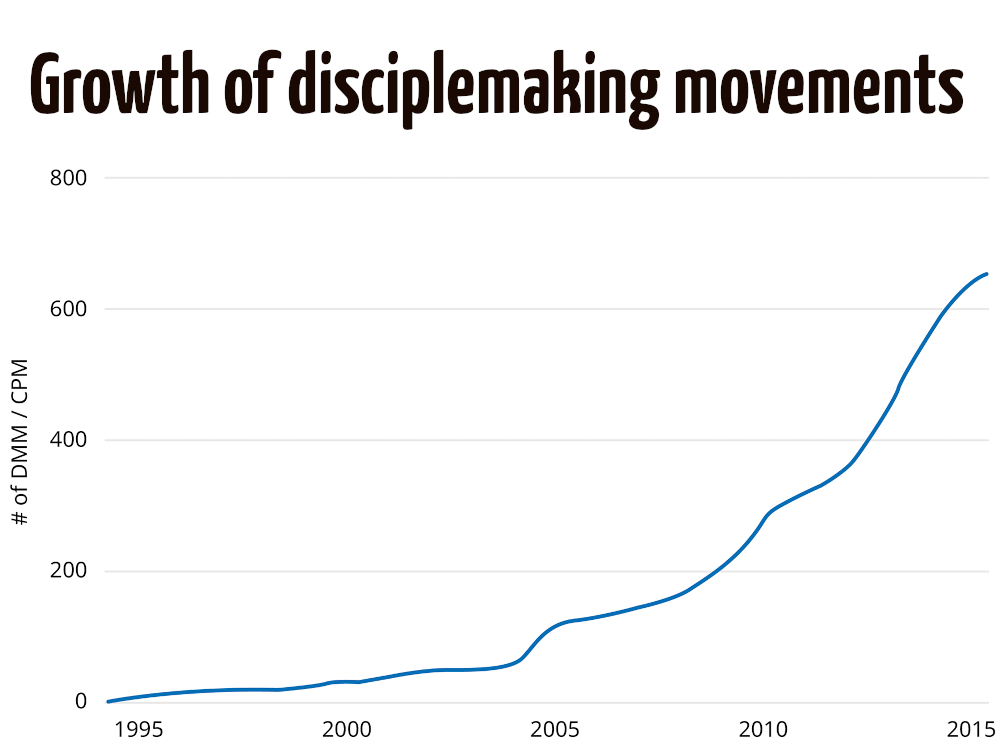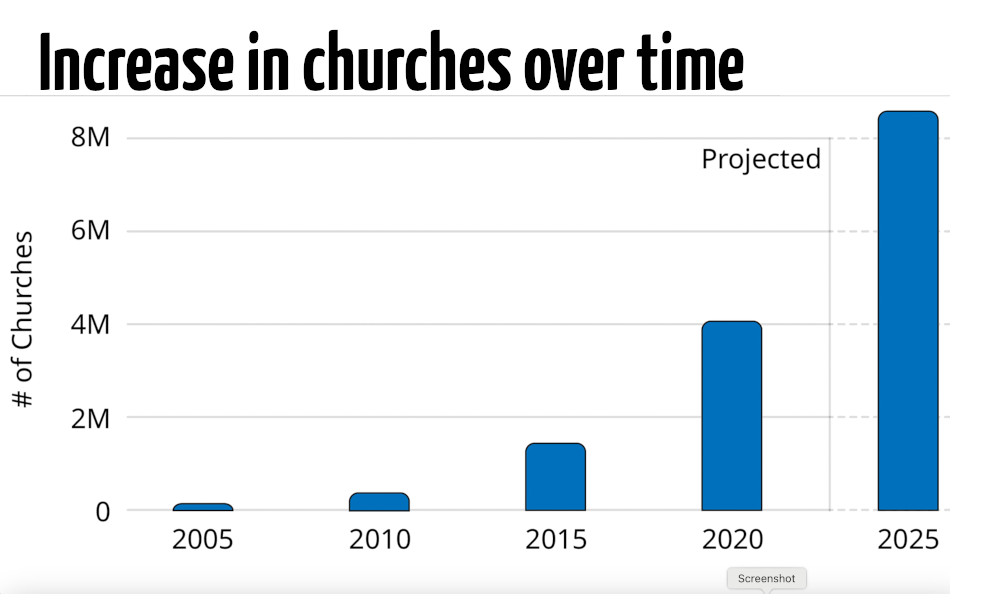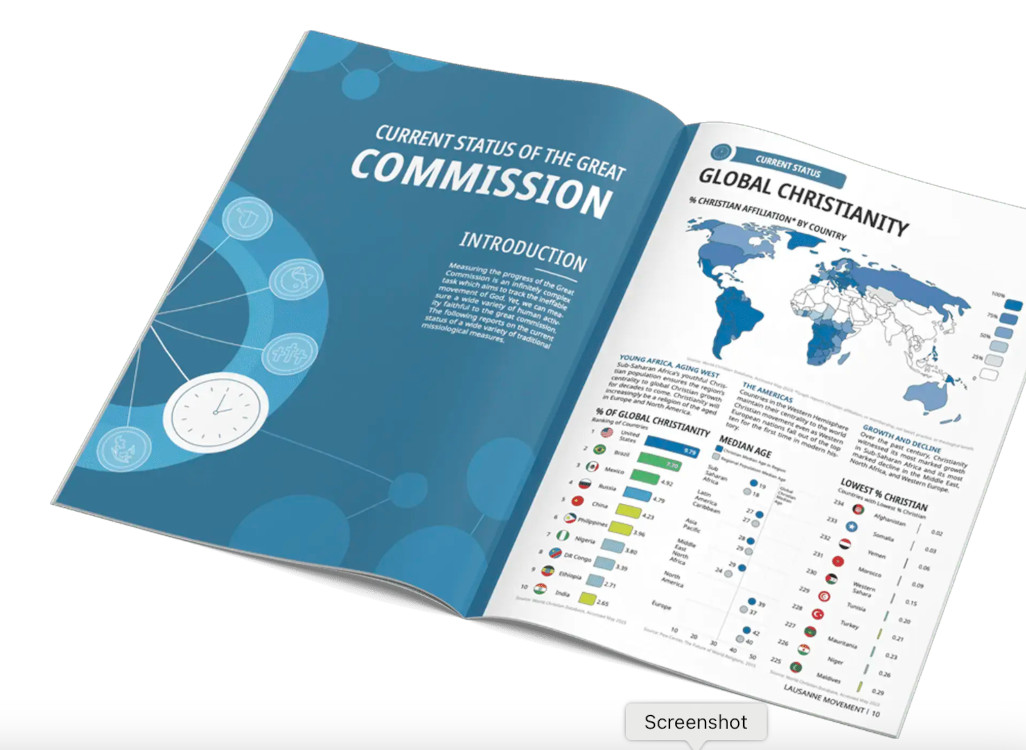The stand-out fact from The State of the Great Commission report from the evangelical Lausanne Movement is the exponential growth of Christianity in the two-thirds world. It rivals the stories of the early church: “Christian communities that had been planted in Asia, Africa, and Latin America in the nineteenth century were watered by mass evangelistic initiatives of Western evangelical organizations in the twentieth. Simultaneously, unprecedented numbers of indigenous mission movements throughout the Global South intensified efforts at witnessing to Christ in ways that were contextually effective.”
Lausanne cites Methodist evangelical academic Timothy Tennant: “the unprecedented 5,000 percent growth of independent indigenous Christian movements in the Global South ‘from only eight million at the turn of the twentieth century to 423 million by the close of the century’”
The State of the Great Commission sees the accelerating growth of Christianity as due to “disciple-making movements” where individual Christians evangelise, setting off “multi-generational” discipling.

“A disciple-making movement (DMM) or church planting movement (CPM) is defined by three characteristics.
“First, there are sequential generations of growth. When an original disciple or church makes a new disciple or church, that is one generation. DMM/CPM are identified when there are at least four successful direct generations. Second, the movement is dynamic and growing. Third, the DMM is greater than approximately 1,000 believers or CPM are greater than approximately 100 churches.”

“DMM/CPM continue to grow with the number of known mature movements over 1,950 and over 1,750 pre-movements and 1,750 initial movements in 2022. And these are only what are known so far. In other words, these figures are a conservative ‘floor’, not an estimate of the ‘ceiling.’
“DMM researchers estimate that there are 100+ million professing disciples (not all baptized) due to DMM, making around 1 percent of the world part of a DMM. Additionally, researchers estimate that there are over 9 million churches emerging from or part of a CPM. Understanding that most of these churches are ‘house churches’ with an average of 14 disciples per church, there are more house churches in CPM than churches in traditional denominations.”
What Australians can learn from the two-thirds world
Julie-anne Laird the Regional Director of Lausanne in Oceania ,and Director of Missional Engagement for City to City Australia discussed the local implacations of the report with Jordan Mullen an expert in digital evangelism in a webinar.
“What we see in the great commission, it’s a command for all of us,” Mullen And I know some people have been talking about this idea of second reformational thinking, which is the first reformation was we all got access to the Bible and we could all read it. And then the reformation that we’re going through now is this realisation of the priesthood of all believers that we are actually all able to disciple ourselves, someone coming to faith.”
Laird situated the Disciple-Making Movements around the world as a challenge to us. “It’s growing rapidly in places where people don’t have much money and is actually about working out how we help people become Christians and stay Christians.
Reflecting on her background with university ministry, Laird adds, “We looked at this quite a bit at uni in terms of actually we see people become Christians, but they haven’t always counted the cost of what it looks like to be a follow of Christ. And so we used to not count someone becoming Christian until they named Christian for about a year where we could see that they’ve just matured and got it of what it meant to live as a follower of Jesus. So I suspect that for a lot of these countries actually the cost of what it means to follow Jesus – they get it. They know there could be incredible persecution. So Actually, Jesus is so worth it. And they are strong in that because they’ve had to really weigh out what does this mean to follow Jesus.”
Mullen sees the church in Iran – one of the fastest growing as an example for us. “They have no money, no buildings, no programmes, no visible leaders because of the persecution, no marketing production on a Sunday, any of those elements that we have very strong in the west. But they’re the fastest growing church.. What they do have is one, one-to-one discipleship as a primary focus of the movement. And then the other thing it says is I think it’s predominantly led by women interestingly because the men are so persecuted, but men and women, but strong focus on women.”
A lesson from Iranian Christians is their big emphasis on discipleship, something that’s often not a priority in the West, Mullen pointed out.
“In our western evangelism, someone comes to maybe evangelism events, someone preaches, someone makes a decision, but then one of the concerns is what happens to those people?
“They have to disciple to convert. So really get to know that person because of the risks of maybe meeting someone who is investigating them. But they find when they do come to Christ and they’re baptised, their faith is seriously counting the cost their focus is on, which is predominantly one-to-one ship and they’re seeing rapid growth.”
Laird, who is a notable maker of friends and gospeller, agrees that Australian Christians are just beginning to see themselves as disciple-makers. “
“There’s definitely been a shift in Australia as we’ve thought about, ‘oh, we haven’t actually really helped people become disciples and what does that look like?’ And people have gone, ‘Okay, we’ve definitely become a bit more consumer-orientated.’
“To me, maturity as a Christian is, as you work out, ‘oh, this is not just for me, this is for everybody else.’ But some people get to that point quicker than others.
“A friend of mine became a Christian, and after about four weeks, she goes, ‘actually, I release you to be friends with other non-Christians because actually that’s what your job is in terms of your time.’ And for her, she goes, ‘yeah, okay, I need to grow my faith, but I just can’t stop telling other people about Jesus.’ How the culture has shifted. We definitely have felt, I think Ill-equipped, but also there’s something in us that’s dulled our faith a little bit or I’m not sure what is it in us that it’s just not just brimming out.”
Laird lays out in simple terms what it takes to form a disciple-making movement. It takes a lot of resources to plant a church – a pastor, a building and money. But disciple-making, by contrast, takes a lot less. “It is costly to run a church in terms of time, and there is definitely people who are just going, man, we just want to do this in a much simpler way. We want to see people come to faith. We want to see people grow in their faith. We want every Christian equipped and just that this is just who they are. Who we are as Christians is to help other people know Jesus.”
The webinar is currently available: sign up at www.stateofthegreatcommission.com.

